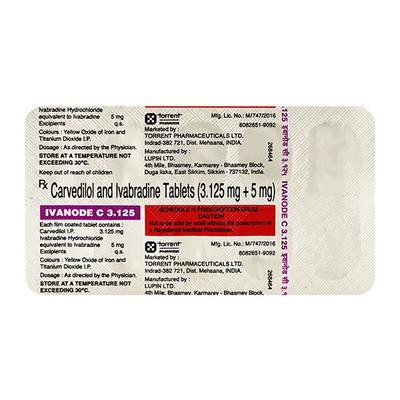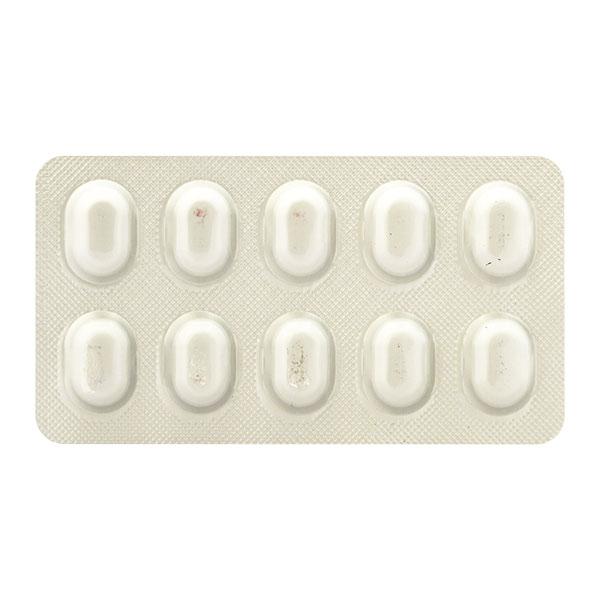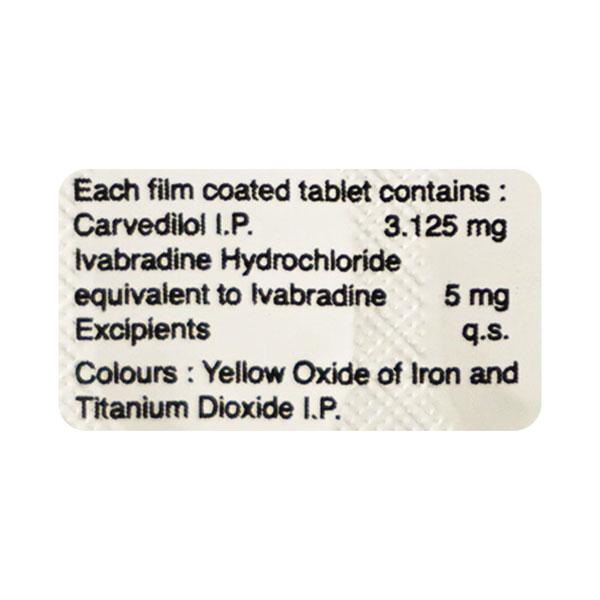

Netmeds First Membership
Quick Links
Introduction About IVANODE C 3.125 TABLET
IVANODE C 3.125 TABLET is a combination of Carvedilol and Ivabradine, which belongs to the group of medicines called Antiarrhythmics. It is indicated for symptomatic management of chronic stable angina pectoris in coronary artery disease patients and to manage chronic heart failure (II-IV NYHA-Class) with systolic dysfunction.
Along with the management, your doctor will monitor your heart rate to know if there are any irregularities in your heart rate. Your doctor may also check your blood glucose levels to know any variations. Avoid grapefruit juice while taking IVANODE C 3.125 TABLET, as it may increase the side effects.
Before taking IVANODE C 3.125 TABLET, inform your doctor if you have retina pigmentosa, diabetes, psoriasis, or hyperthyroidism (increased thyroid hormone in the body). IVANODE C 3.125 TABLET is not recommended in patients having metabolic acidosis, unmanaged phaeochromocytoma, and stroke. Consult your doctor before taking it.
IVANODE C 3.125 TABLET is not recommended in patients having lung, liver, and heart diseases. Patients with kidney disease should use it with caution. IVANODE C 3.125 TABLET is not recommended during pregnancy and lactation. Contact your doctor before taking it. IVANODE C 3.125 TABLET should be used with caution in elderly patients (aged above 65 years). Consult your doctor before taking it.
The most common side effects of taking IVANODE C 3.125 TABLET are headache, dizziness, nausea, diarrhea, abdominal pain, and vomiting. Consult your doctor if any of the side effects worsen or persist for a longer duration.
Uses Of IVANODE C 3.125 TABLET
It is used to manage:
- Stable angina pectoris (which causes chest pain)
- Chronic heart failure
How IVANODE C 3.125 TABLET Works
IVANODE C 3.125 TABLET is a combination of carvedilol and ivabradine. Carvedilol is a beta-blocker that slows the heartbeat, lessens the force with which the heart muscle contracts, and reduces the blood vessel contraction in the heart, brain, and throughout the body. Ivabradine works mainly by reducing the heart rate by a few beats per minute. This lowers the heart’s need for oxygen, especially in situations when an angina attack is more likely to happen. Thus IVANODE C 3.125 TABLET helps to control and reduce the number of angina attacks.
How to use IVANODE C 3.125 TABLET
Take IVANODE C 3.125 TABLET as advised by your physician. Swallow IVANODE C 3.125 TABLET with a glass of water. Do not crush or chew the medicine. Your doctor will decide the correct dose and duration of therapy for you depending upon your age, body weight, and disease condition.
Side Effects Of IVANODE C 3.125 TABLET
Common
- Luminous visual phenomena (brief moment of increased brightness, most often caused by sudden changes in light intensity)
- Headache
- Dizziness
- Shortness of breath or swelling of the feet or legs due to fluid buildup (heart failure)
- Low blood pressure (feeling dizzy or light-headed), generalized weakness, feeling of tiredness
- Lung or chest infections
- Infections of the urinary tract
- Decreased number of red blood cells
- Increased levels of cholesterol in the blood
- Increased levels of blood sugar (diabetes)
- Weight gain
- Being or feeling depressed
- Lacrimation decreased (dry eyes), impaired vision, eye irritation, blurred vision (cloudy vision)
- Fluid retention
- Buildup of fluid in the lungs
- Modification in the heart functioning (slowing down of the heart rate)
- Heart block (irregular heartbeats)
- Irregular rapid contraction of the heart
- Dizzy, light-headed, or faint when you stand or sit up quickly
- Cold hands and feet, obstruction of the large arteries in the arms and legs, worsening of symptoms in patients with Raynaud’s disease, claudication (pain in the leg that gets worse when you walk)
- Uncontrolled blood pressure
- Shortness of breath, asthma
- Nausea, vomiting
- Stomach pain
- Indigestion
- Diarrhoea
- Pain in the extremities
- Disease with painful
- Swollen joints caused by uric acid crystals (gout)
- Problems with your kidneys, including problems starting, passing, and stopping urination or altered frequency of urination
Uncommon
- Increased level of some white blood cells
- Increased level of uric acid in the blood
- Sleep disturbances, including nightmares, confusion
- Fainting (syncope), light-headedness, muscular weakness, blurred vision, and feeling faint (pre-syncope), tingling or numbness of the hands or feet
- Double vision, spinning sensation (vertigo)
- A pain or uncomfortable feeling in the chest, palpitations, changes in heart rate (fast, slow, or irregular)
- Low blood pressure (possibly related to slow heart rate)
- Constipation
- Certain skin reactions (such as skin rash, hives, itching, increased sweating, or psoriatic or lichen planus-like skin lesions)
- Hair loss
- Swelling of the face, lips, tongue, or throat, which may cause difficulty breathing or swallowing (angioedema), rash
- Muscle cramps
- Sexual dysfunction, impotence (inability to get or maintain an erection)
Rare
- Bleeding or bruising more easily than normal (low blood platelet count)
- Stuffy nose
- Wheezing
- Dry mouth
- Redness of the skin
- Feeling unwell
How To Manage Side Effects
Constipation
Eat plenty of fiber-rich foods, such as fresh fruits, vegetables, and cereals, and drink plenty of water. Exercise more regularly. Consult your doctor if constipation persists.
Diarrhea
Drink lots of fluids, such as water or fruit juice, to keep yourself hydrated. Do not consume any medicine on your own without consulting your doctor.
Dizziness Or Drowsiness
Try to lie down or sit immediately if you feel dizzy. Drink enough water to get hydrated. Consult your doctor if the dizziness does not improve.
Dry Mouth
Try chewing sugar-free gum or sugar-free candies to stimulate the flow of saliva. Avoid caffeine-containing drinks. Drink plenty of water to avoid dehydration. Consult your doctor if the dry mouth is not improving.
Headache
Use a cold pack or hot pads to reduce the pressure on your head. Reduce looking into bright light and try to get adequate sleep. Consult your doctor if the headache is not improving.
Nausea And Vomiting
Take this medicine with or just after meals. Stick to simple meals. Avoid eating oil-rich or spicy foods. Consult your doctor if nausea and vomiting worsen.
Skin rash Or Itching
Avoid hot baths because hot water can irritate your skin further. Do not scratch the affected area. Use protective clothing when going outdoors. Regularly moisturize your skin. Consult your doctor if the symptom worsens.
Stomach Pain
Try to rest and relax. Eat and drink slowly, or try to have smaller and more frequent meals. Keep a heat pad on your stomach. If the symptom does not improve, contact your doctor.
Warning & Precautions
Pregnancy
ContraindicatedIVANODE C 3.125 TABLET is not recommended for use in pregnant women. Consult your doctor before taking it.
Breastfeeding
ContraindicatedIVANODE C 3.125 TABLET is not recommended for use by breastfeeding women. Consult your doctor before taking it.
Driving and Using Machines
ContraindicatedDo not drive or operate any machines if you feel dizziness, fatigue, or decreased alertness while taking IVANODE C 3.125 TABLET.
Alcohol
ContraindicatedConsumption of alcohol is not recommended while taking IVANODE C 3.125 TABLET. Consult your doctor for advice.
Kidney
Use with CautionIVANODE C 3.125 TABLET should be used with caution in patients having renal insufficiency. Consult your doctor before taking.
Liver
ContraindicatedIVANODE C 3.125 TABLET is not recommended in patients having severe liver impairment. Consult your doctor before taking.
Allergy
ContraindicatedDo not take IVANODE C 3.125 TABLET if you are allergic to carvedilol, ivabradine, or any other ingredients of this medicine.
Lungs
ContraindicatedIVANODE C 3.125 TABLET is not recommended in patients having chronic obstructive pulmonary disorder associated with bronchial obstruction and a history of bronchospasm or asthma. Consult your doctor before taking.
Heart Disease
Consult your doctorIVANODE C 3.125 TABLET is not recommended in patients with acute or unstable or decompensated heart failure, pacemaker dependent (heart rate imposed exclusively by the pacemaker), with a pre-management resting heart rate below 50 beats per minute, severe hypotension, or congenital QT syndrome. It should be used with caution in patients with ischaemic heart disease. Consult your doctor before taking.
Use In Pediatrics
Consult your doctorThe safety and efficacy of IVANODE C 3.125 TABLET in children and adolescents have not been established. Consult your doctor before taking.
Use In Geriatrics
Use with CautionIVANODE C 3.125 TABLET should be used with caution in elderly patients (aged above 65 years). Consult your doctor before taking.
Others
IVANODE C 3.125 TABLET is not recommended for use if you:
- Have metabolic acidosis (accumulation of acid in the body due to kidney problems)
- Have unmanaged phaeochromocytoma (a non-cancerous tumour in the adrenal glands)
- Have stroke
Before taking IVANODE C 3.125 TABLET, inform your doctor if you:
- Have retinitis pigmentosa (a rare eye disease affecting the retina of the eye)
- Have diabetes
- Have hyperthyroidism
- Wear contact lenses
- Have a family history of psoriasis
Interactions
A. Drug-Drug interactions:
Before taking IVANODE C 3.125 TABLET, inform your doctor if you are taking any of the following medicines:
- Medicines used to manage fungal infections (Ex. ketoconazole, itraconazole)
- Medicines used to manage bacterial infections (Ex. clarithromycin, erythromycin, josamycin, telithromycin)
- HIV protease inhibitors (Ex. nelnavir, ritonavir, and nefazodone)
- Diltiazem, amlodipine, and verapamil (medicines used to manage heart diseases)
- Cimetidine (medicine used to manage acidity)
- Fluoxetine (medicine used to manage depression)
- Cardiac glycosides (Ex. digoxin digitoxin)
- Cyclosporine (medicine used to manage organ rejection during organ transplantation)
- Anti-diabetic medicines (Ex. insulin, oral hypoglycaemics)
- Clonidine (medicine used to manage high blood pressure)
- Anaesthetics (Ex. ketamine, etomidate)
- Medicines used to manage asthma (Ex levalbuterol, albuterol)
- Medicine used to manage water retention (Ex. chlorthalidone, frusemide)
- Medicine used to manage pain and inflammation (Ex. diclofenac, ibuprofen)
- Medicines used to manage high blood pressure (Ex. captopril, enalapril)
- Medicines used to manage inflammation (Ex. prednisolone)
- Warfarin (medicine used to manage clotting of blood)
- Ergotamine (medicine used to manage headaches)
- Nitrates (medicines used to manage angina)
- Medicine used to manage neural problems (Ex. doxepin, amitriptyline)
- Medicines used to manage eye diseases (Ex. betaxolol)
- Medicines used to manage fits (Ex. phenobarbital, primidone)
B. Drug-Food interaction:
Avoid drinking grapefruit juice while taking IVANODE C 3.125 TABLET, as it may increase the risk of side effects.
Overdosage:
If you or anyone else accidentally takes too much of IVANODE C 3.125 TABLET, consult your doctor immediately or visit the nearby hospital.
Synopsis
| Drug | : | Carvedilol, Ivabradine |
| Pharmacological Category | : | Beta blockers, Hyperpolarization-activated cyclic nucleotide gated (HCN) channel blockers |
| Therapeutic Indication | : | Chronic heart failure, Chronic stable angina pectoris |
| Dosage Forms | : | Tablet |
More Information
Storage
- Keep IVANODE C 3.125 TABLET out of reach of children
- Store at a temperature not exceeding 30°C
FAQs About IVANODE C 3.125 TABLET
Q: What is IVANODE C 3.125 TABLET used for?
A: IVANODE C 3.125 TABLET is indicated for symptomatic management of chronic stable angina pectoris in coronary artery disease patients and to manage chronic heart failure (II-IV NYHA-Class) with systolic dysfunction.
Q: How IVANODE C 3.125 TABLET works on my body?
A: IVANODE C 3.125 TABLET is a combination of Carvedilol and Ivabradine. Carvedilol is a beta-blocker that slows the heartbeat, lessens the force with which the heart muscle contracts, and reduces the blood vessel contraction in the heart, brain, and throughout the body. Ivabradine works mainly by reducing the heart rate by a few beats per minute. This lowers the heart’s need for oxygen, especially in situations when an angina attack is more likely to happen. Thus IVANODE C 3.125 TABLET helps to control and reduce the number of angina attacks.
Q: What are the dietary modifications I should follow while taking IVANODE C 3.125 TABLET?
A: Avoid drinking grapefruit juice and alcohol while taking IVANODE C 3.125 TABLET, as it may increase the side effects. Consult your doctor for advice.
Q: Can IVANODE C 3.125 TABLET lower your blood sugar?
A: IVANODE C 3.125 TABLET may impair the glucose tolerance, whereas hypoglycaemia may occur in diabetic patients under insulin and anti-diabetic therapy. So it is essential to monitor the blood glucose levels in these patients undergoing management with IVANODE C 3.125 TABLET.
Q: Is IVANODE C 3.125 TABLET suitable for elderly patients?
A: IVANODE C 3.125 TABLET should be used with caution in elderly patients (aged above 65 years). Consult your doctor before taking.
Q: Is IVANODE C 3.125 TABLET safe during pregnancy?
A: IVANODE C 3.125 TABLET is not recommended for use in pregnant women. Consult your doctor before taking it.
Q: What are the side effects of IVANODE C 3.125 TABLET?
A: The most common side effects of taking IVANODE C 3.125 TABLET are headache, dizziness, nausea, diarrhea, abdominal pain, vomiting. Consult your doctor if any of the side effects worsen or persist for a longer duration.
Q: Who should not take IVANODE C 3.125 TABLET?
A: IVANODE C 3.125 TABLET is not recommended for use if you have metabolic acidosis (accumulation of acid in the body due to kidney problems), unmanaged phaeochromocytoma (non-cancerous tumour in the adrenal glands), stroke, severe liver impairment, chronic obstructive pulmonary disorder associated with bronchial obstruction and a history of bronchospasm or asthma, acute or unstable or decompensated heart failure, pacemaker dependent (heart rate imposed exclusively by the pacemaker), with a pre-management resting heart rate below 50 beats per minute, severe hypotension, congenital QT syndrome, or if you are allergic to Carvedilol, Ivabradine, or any other ingredients of this medicine.
Q: What precautions must be taken while using IVANODE C 3.125 TABLET?
A: Before taking IVANODE C 3.125 TABLET, inform your doctor if you have renal insufficiency, ischaemic heart disease, retinitis pigmentosa (a rare eye disease affecting the retina of the eye), diabetes, hyperthyroidism, or if you wear contact lenses or have a family history of psoriasis.
Q: Can IVANODE C 3.125 TABLET be used with children?
A: The safety and efficacy of IVANODE C 3.125 TABLET in children and adolescents have not been established. Consult your doctor before taking.
References
1. KD Tripathi. Antiadrenergic drugs and drugs for glaucoma. Cardiovascular drugs. Essentials of Medical Pharmacology. Eighth Edition, 2019. Page – 165, 600.
2. Yue-Chun L, Teng Z, Na-Dan Z, Li-Sha G, Qin L, Xue-Qiang G, Jia-Feng L. Comparison of effects of ivabradine versus carvedilol in murine model with the Coxsackievirus B3-induced viral myocarditis. NIH National Library of Medicine, National Center for Biotechnology Information. [Accessed on 11th July 2024] https://www.ncbi.nlm.nih.gov/pmc/articles/PMC3386276/
3. Ciplamed. CARLOC-1 Tablets. [Revised in 30th June 2021] [Accessed on 11th July 2024] https://www.ciplamed.com/product-index/carloc-i-tablets
4. Les Laboratoires Servier. [Accessed on 11th July 2024] https://file.wuxuwang.com/hma/NL_H_3546_001_FinalPI.pdf
Useful Diagnostic Tests
- Complete Blood Count (CBC)/ Hemogram
- Kidney Function Test (KFT)
- Cardiac Risk Profile
- Basic Heart Care
- Extended Heart Care
- Advance Heart Care
- Comprehensive Heart Care
- Lipid Profile Test/Cholesterol-Total, Serum
- Netmeds Healthy Heart
- Cardiac Risk Markers – Advanced










